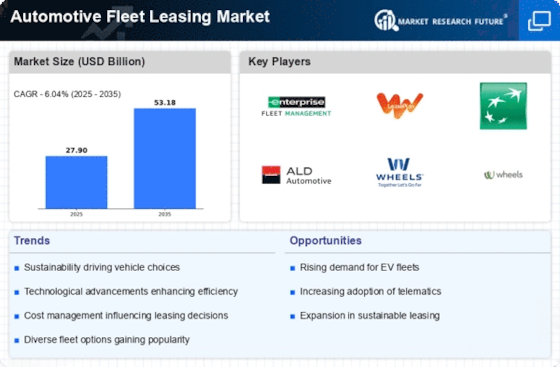Market Share
Automotive Fleet Leasing Market Share Analysis
There is a discernible trend as individuals transition from owning vehicles to opting for vehicle leasing, primarily driven by the imposition of higher taxes associated with personal vehicle purchases. The shift towards vehicle leasing is motivated by the potential financial advantages it offers, particularly in comparison to the fiscal implications of purchasing a personal vehicle. Monthly lease payments typically prove to be more economical than those incurred through financial leasing.
In the context of financial leasing, payments tend to be higher compared to fleet leasing arrangements. The rationale behind this lies in the fact that financial leasing encompasses not only the cost of the vehicle but also factors in additional expenses such as taxes levied on the entire purchase and various other finance-related costs. In contrast, fleet leasing structures are characterized by lower monthly payments, making them an appealing alternative for individuals seeking cost-effective and flexible transportation solutions.
A crucial consideration driving the inclination towards vehicle leasing is the mitigation of future value risk associated with the leased vehicle. Unlike purchased vehicles, leased vehicles entail a diminished risk of value fluctuation. This is particularly significant when it comes to selling the vehicle, as the market price for a particular vehicle model may undergo unpredictable fluctuations. By opting for vehicle leasing, individuals can navigate this uncertainty and potential depreciation, making the financial aspect of vehicle ownership more stable and predictable.
The choice to shift from vehicle purchase to leasing is underscored by a strategic assessment of the financial landscape, emphasizing the advantages of a lease-centric approach. The lower monthly payments associated with leasing not only alleviate immediate financial burdens but also contribute to a more sustainable and predictable financial outlook for individuals. The appeal of vehicle leasing becomes even more pronounced when considering the comprehensive financial obligations tied to purchasing a personal vehicle, where taxes and other associated costs substantially impact the overall expenditure.
In conclusion, the discernible shift from vehicle ownership to leasing is fueled by the desire to navigate the intricate web of financial considerations associated with personal vehicle purchases. The imposition of higher taxes serves as a catalyst for individuals seeking more financially viable alternatives. By embracing vehicle leasing, individuals can enjoy the advantages of lower monthly payments and a reduced exposure to future value risks, contributing to a more streamlined and cost-effective approach to personal transportation. This shift not only reflects a pragmatic response to financial considerations but also highlights the growing preference for flexibility and financial predictability in the realm of personal vehicle usage.


















Leave a Comment